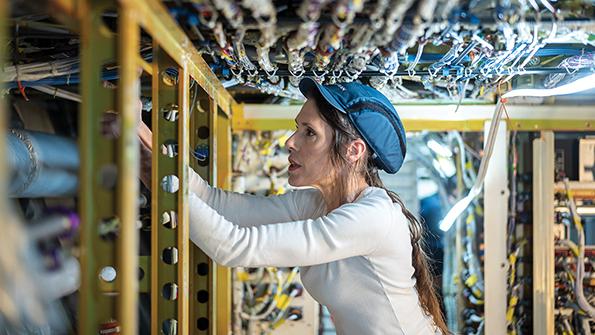
As the industry faces persistent hiring challenges, GIFAS is pressing on with a promotional campaign called Aerospace Is Hiring that was launched last year.
When Airbus CEO Guillaume Faury confirmed the airframer’s production target for 2024 during a press conference on Jan. 10, he did not give a near-term goal for 2023. That was essentially the consequence of widespread unpredictability in the supply chain. French companies account for a large proportion of it and have been particularly hit by a volatile environment.
Moreover, the production rate for the Airbus A320neo family in 2022 appeared to have been well below the ramp-up curve expected earlier. Senior executives in the French aerospace industry have expressed contentment about the buoyant market and have reasons to see light at the end of the tunnel. However, how they will solve the myriad issues facing them remains to be seen.
- Energy prices and cash flow issues begin to ease
- Hiring is still a conundrum
Signs that the situation is improving are emerging on at least two fronts—energy prices and cash flow. Skyrocketing energy prices have affected the entire supply chain, notably small companies with an energy-intensive business where electricity accounts for a significant proportion of production costs.
French aerospace lobbying association GIFAS is keeping a close eye on the developments. Action by the government, including financial support, is beginning to prove effective. “At the end of 2022, we saw a few panic reactions,” says Clementine Gallet, president of the GIFAS committee for small companies. “Since the government’s scheme is in place, we can see the first results. Solutions will be found on a case-by-case basis.”
Cash flow issues are well on the way to being curbed. In 2020, amid the worst moments of the COVID-19 crisis, an investment fund was created to help suppliers consolidate or just survive. Companies with an overall healthy financial background but temporary cash flow problems can receive support. The fund, led by Tikehau ACE Capital, helps them increase capital.
So far, the investment fund has worked well, and 50-60 recapitalization operations have been conducted, GIFAS data shows. Out of the €750 million ($806 million) raised, about €600 million has been used, says GIFAS Director General Pierre Bourlot. “A lot has been done, such as supporting metallurgy specialist Aubert & Duval,” Bourlot says. “We are talking to [Tikehau], and we do not see a need for more fundraising.”
The initial expectation was for the fund to reach €1 billion. “Our reckoning was that, with €1 billion in equity, we would find access to €1 billion in debt,” said Faury, who is also GIFAS’ chairman, during a Jan. 5 press conference. “The first year saw little activity because companies were using government support, such as state-backed loans. After a certain time, it no longer makes sense to increase the fund’s capital, so we are staying close to €750 million.”
Nevertheless, the supply chain’s struggles and the entire industry’s hiring problems will remain the dominant themes in 2023, Faury added. The aerospace sector has been confronted with the persistent challenge of recruiting enough skilled workers and specialists in various domains. More recently, suppliers have had to cope with inflation, loan repayment, the requirement to follow an aggressive aircraft production ramp-up and long-term investments.
Hiring has proved particularly difficult for those small companies based away from large cities. That is one of the goals of a campaign GIFAS launched last year called Aerospace Is Hiring. “Some companies find it hard to promote themselves and find talent,” Gallet says.
Large OEMs have seen a knock-on effect. “For last year’s deliveries, we at Airbus had to downgrade our guidance twice,” Faury said. “That was a big frustration. The supply chain has huge problems in its operations. Against that backdrop, we worked miracles.”
The industry is in a struggle to find the right people, especially in new technologies. “We want employees who are competent in aviation, defense or space and at the same time have skills in cybersecurity, data crunching or artificial intelligence,” he said. In cybersecurity, Airbus has created its own training programs to ensure it has enough specialists.
In 2022, large companies have caused the supply of such experts to dry out, Faury added. “We are aware small companies must be able to hire some in 2023,” he said. “Otherwise, [the ramp-up] will not work.”
In energy, the inability of a supplier to foresee its own costs has been a serious argument against investing in Europe. It is effectively leading suppliers to consider creating or expanding their production plants in other regions, where energy prices are lower, Faury said. GIFAS has asked governments and the European Commission to help the industry anticipate price evolution and make decisions accordingly.
Overall, the way the industry is organized has moved to more resilience, from pure optimization, Faury said. Resilience means reducing the risk of being affected by events of various nature, such as a pandemic or geopolitical tensions. The earlier globalization trend has thus been replaced with regionalization, where local players work together, Faury added.
